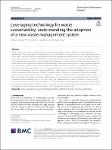Item Infomation
Full metadata record
| DC Field | Value | Language |
|---|---|---|
| dc.contributor.author | Darina, Vorobeva | - |
| dc.contributor.author | Ian J., Scott | - |
| dc.contributor.author | Tiago, Oliveira | - |
| dc.date.accessioned | 2023-04-18T07:41:17Z | - |
| dc.date.available | 2023-04-18T07:41:17Z | - |
| dc.date.issued | 2023 | - |
| dc.identifier.uri | https://link.springer.com/article/10.1186/s42834-023-00174-x | - |
| dc.identifier.uri | https://dlib.phenikaa-uni.edu.vn/handle/PNK/8040 | - |
| dc.description | CC BY | vi |
| dc.description.abstract | Many countries are under escalating pressure to meet legally binding targets in relation to recycling and waste management. This paper explores how innovative tools, including blockchain, economic incentives, and gamification, encourage consumer adoption of a novel household waste management system. We focus on developing a comprehensive framework that combines UTAUT2 (the unified theory of acceptance and use of technology 2) with novel features in the waste management context and additional behavioral construct, intention to recommend the system to others. We tested the proposed model using the partial least square structural equation modeling approach based on a survey of 400 respondents. The results indicate that in addition to effort expectancy, social influence, and hedonic motivation, trust, a property of blockchain technology, also impacts the respondent’s behavioral intention to use the new system. | vi |
| dc.language.iso | en | vi |
| dc.publisher | Springer | vi |
| dc.subject | Leveraging technology | vi |
| dc.title | Leveraging technology for waste sustainability: understanding the adoption of a new waste management system | vi |
| dc.type | Book | vi |
| Appears in Collections | ||
| OER - Kỹ thuật điện; Điện tử - Viễn thông | ||
Files in This Item:

